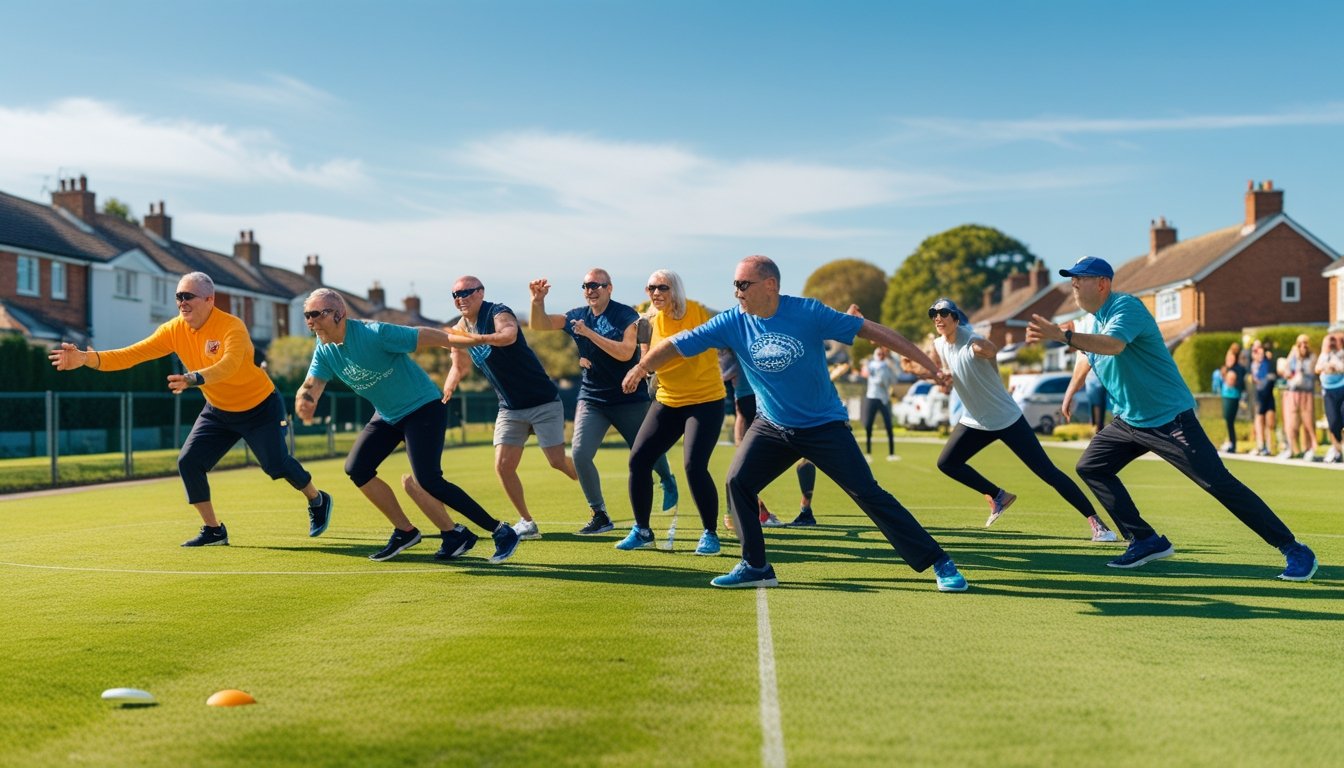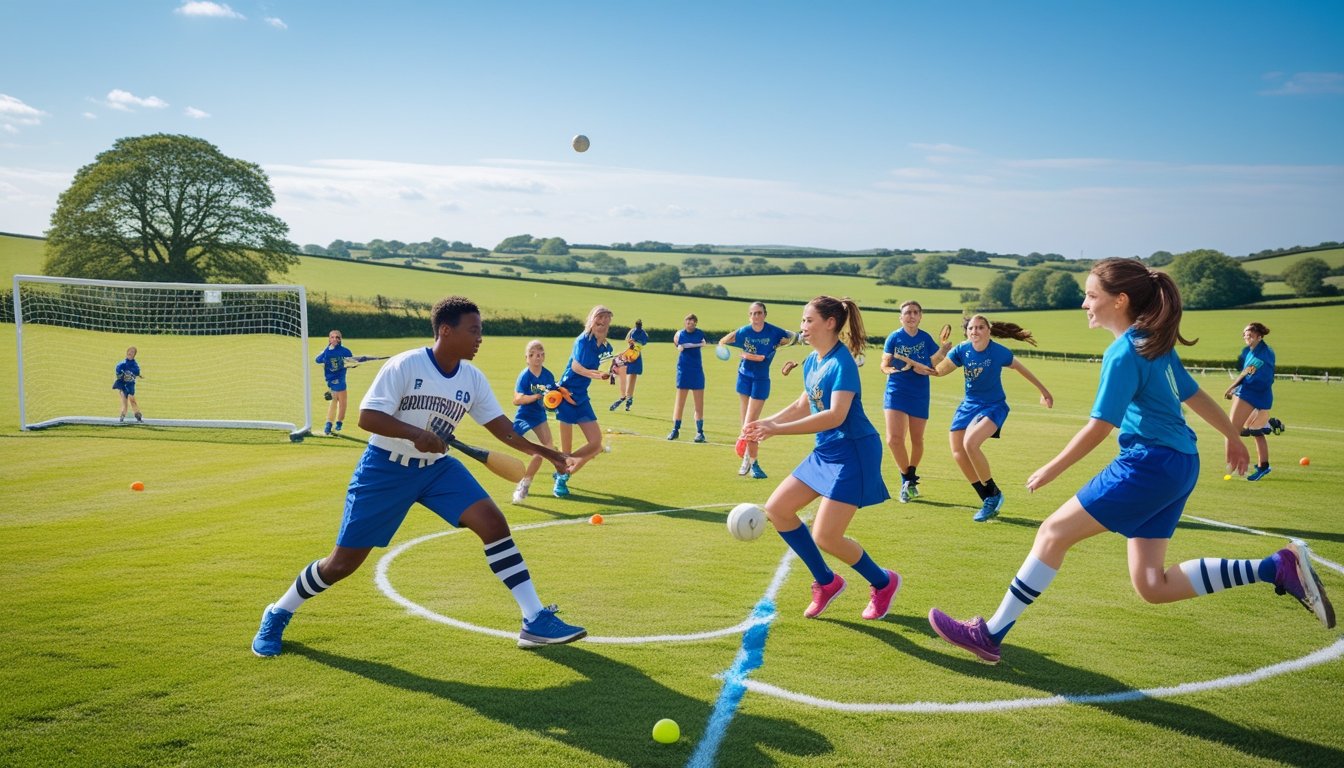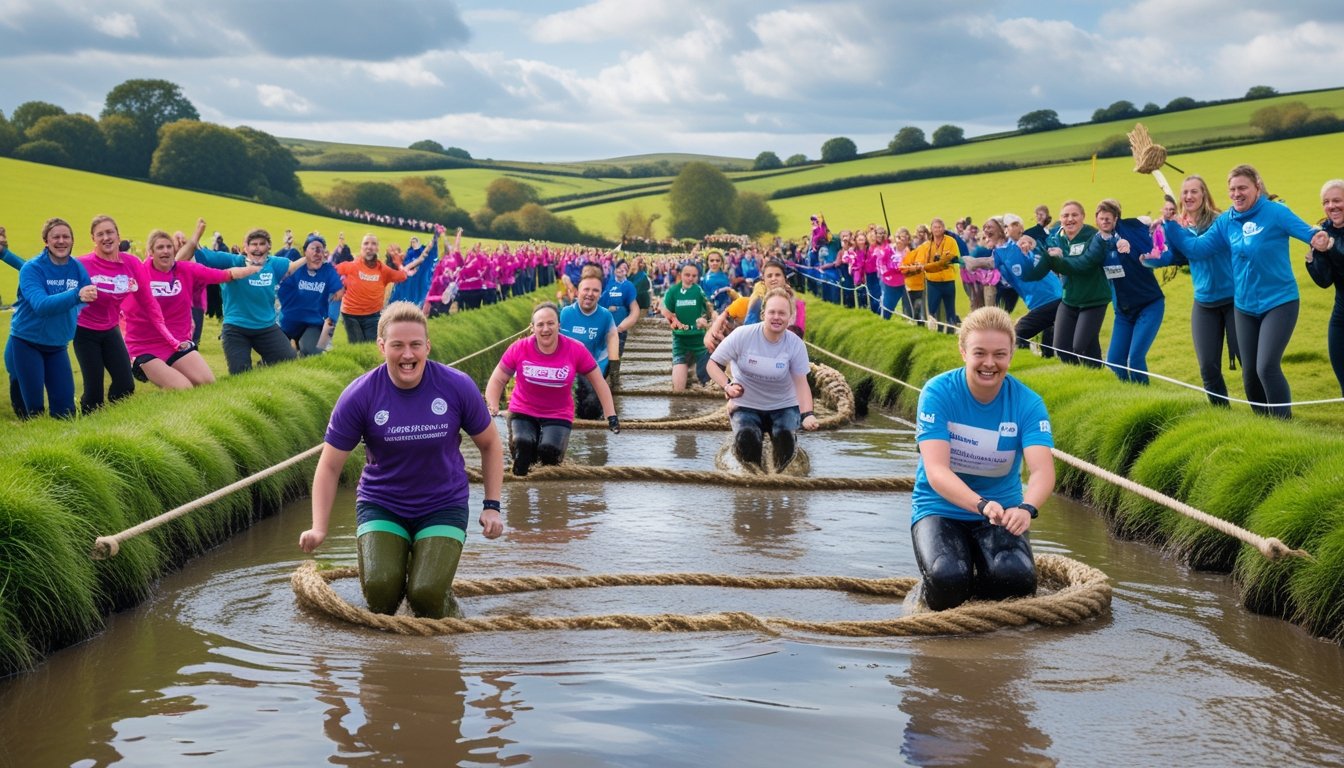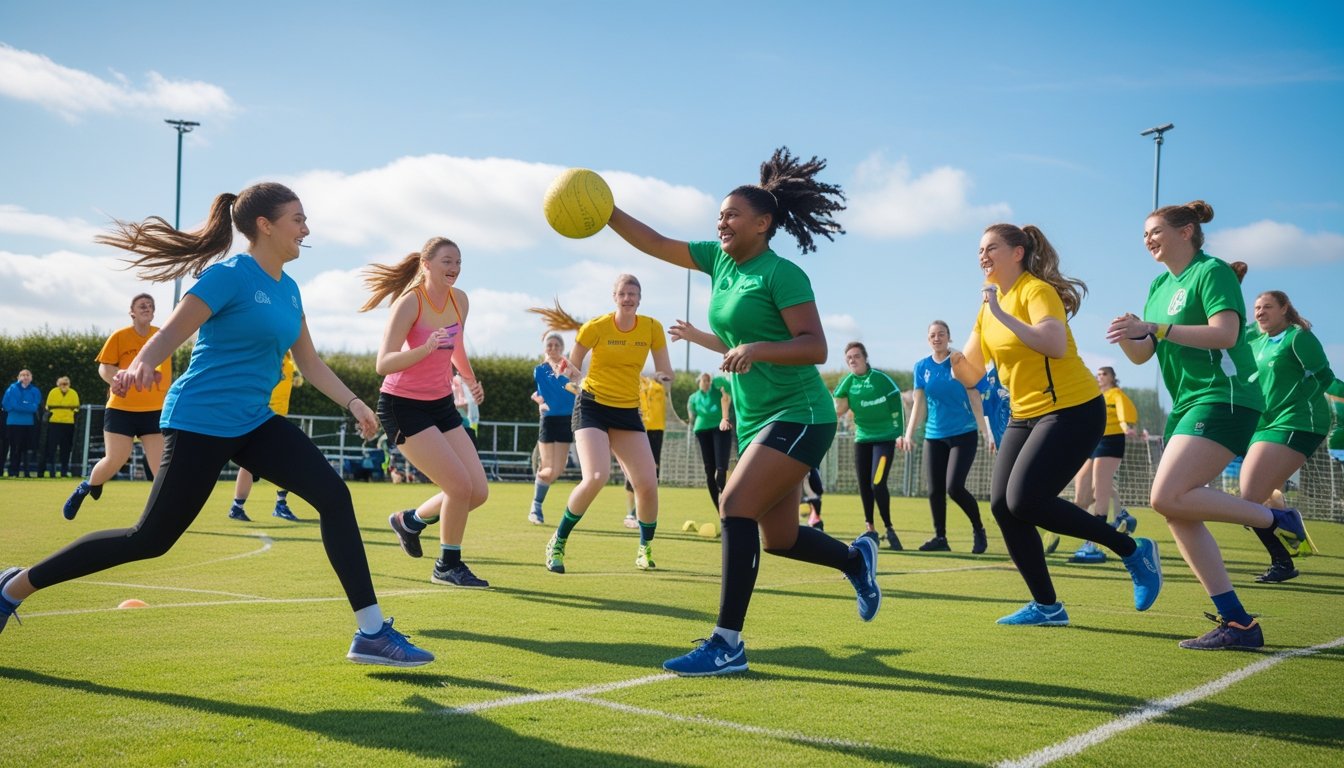Late updated: 18 Oct 2025 13:10
Written by: Emma Saunders
Exploring Uncommon Team Sports in the UK: A Definitive Guide
Exploring the vibrant landscape of British sports reveals a tapestry of unique and lesser-known team sports that captivate with their quirks and energy. While football and cricket often take centre stage, delving into more obscure sports presents a fascinating opportunity to witness tradition and innovation in harmony. These sports are not just pastimes; they embody the diverse cultural heritage of the UK, adding character and charm to community landscapes across the region.

The UK offers a remarkable variety of such activities, where local traditions often influence the rules and conduct of play. From the thrilling spectacle of cheese rolling to the unusual but exhilarating bog snorkelling competitions, these sports demonstrate a spirited embrace of creativity and camaraderie. Each activity presents an opportunity to connect with local communities, providing insight into the rich history and collaborative spirit that define these events.
Participating in or even spectating these uncommon team sports can deepen our appreciation of the diversity and adaptability of British culture. They invite us to step beyond the conventional and explore a world filled with unexpected excitement and tradition. Exploring these sports can transform how we engage with sport as both participants and enthusiasts.
Key Takeaways
- Uncommon UK team sports offer a blend of tradition and innovation.
- These sports provide insight into British cultural diversity.
- Participation enhances appreciation and connection to the local community.
Notable Uncommon Team Sports in the UK

In the UK, several team sports stand out due to their unique blend of tradition and quirkiness. From bog snorkelling to the magical world of quidditch, these activities offer more than just physical challenge; they represent community spirit and cultural heritage.
Bog Snorkelling and Its Welsh Origins
Bog snorkelling sounds unconventional, but it has put Llanwrtyd Wells, Wales on the map. This unusual sport involves competitors swimming through a water-filled trench cut into a peat bog while wearing snorkels and flippers. It's not just a local pastime but an internationally recognised event.
Each year in August, the World Bog Snorkelling Championship draws participants from around the globe, bringing together enthusiasts for a muddy day of fun. It's an athletic challenge combined with a great sense of humour, showcasing the community's vibrant spirit. The event highlights the area's eccentric charm and offers visitors a unique experience of Welsh culture.
Competitive Cheese Rolling at Cooper’s Hill
Cheese rolling at Cooper's Hill is as exhilarating as it is daring. Located in Gloucestershire, this event sees participants chasing a wheel of Double Gloucester cheese down a steep hill. It sounds simple, yet the descent is chaotic and results in entertaining tumbles.
Historically, this competition dates back to early 19th century, providing a thrilling spectacle for both locals and tourists. The prize stays true to tradition—a wheel of the prestigious cheese. Despite safety concerns, the event continues to draw brave competitors and enthusiastic spectators each May, emphasising the community’s commitment to keeping this peculiar tradition alive.
Welly Wanging and Its Community Appeal
Welly wanging, or welly-wanging as it's sometimes known, infuses sport with a bit of countryside charm. Originally a light-hearted way to pass time, it involves throwing a Wellington boot as far as possible. While informal, it has grown to have organised competitions with defined rules.
Participating in welly wanging is often seen at village fairs and local festivals, making it a wonderful community activity. It's an event that fosters friendly competition and is open to all ages, ensuring everyone can join in the fun. This sport embodies the rural culture and adds an enjoyable twist to traditional sporting events.
The Phenomenon of Quidditch
Quidditch may have started as a fictional game in the "Harry Potter" series, but it has transformed into an impressive real-life sport across the UK. Mixed-gender teams compete in a non-magical adaptation that combines elements of rugby, dodgeball, and tag.
This sport requires agility and strategy, with players running on brooms and aiming to score goals. Quidditch leagues have spread rapidly across the country, with university teams leading the charge. The inclusive nature and whimsical flair capture the imagination, while also promoting teamwork and fitness. The UK hosts regular quidditch tournaments, reflecting how literature has crossed into real, active participation.
Wider Variety of Unusual Team Competitions

In the UK, unique team sports bring life to centuries-old traditions and quirky modern-day events. These unusual competitions not only entertain but also celebrate the diverse cultural heritage of the regions they originate from. Let's discover some of the most intriguing team events that showcase the country's inventive spirit.
Dorset Knob Throwing and Rural Traditions
Dorset Knob Throwing is a peculiar sport rooted in rural traditions. This event involves participants tossing a hard, dry biscuit known as a Dorset Knob as far as possible. Teams compete in various challenges, including the longest throw and relay events. Held annually in Dorset, this competition draws locals and tourists alike to engage in festivities that pay homage to rural life.
The event also features other activities like jam and spoon races and guess the weight of the big knob. These entertaining competitions create a vibrant atmosphere, encouraging community bonding while celebrating local craftsmanship in biscuit-making. Although seemingly whimsical, these activities connect us to Dorset’s cultural roots.
Shin-Kicking: History and Modern Practice
Shin-kicking is a part of the Cotswold Olimpick Games, a nod to ancient traditions of Gloucestershire. This rustic sport involves two opponents attempting to knock each other over by kicking their shins. Participants wear straw-stuffed trousers for protection, though injuries are not uncommon.
Historically, shin-kicking dates back to the early 17th century and has evolved into a team competition, where coordination and strategy are key. Today, it's a celebrated event that attracts thousands, with rules ensuring safety while maintaining the competitive edge. The modern practice honours its origins, blending historical authenticity with contemporary enthusiasm for this strikingly unique sport.
Gurning as a Team Event
Gurning might seem an individual effort at first glance, but in team settings, it takes on a new dimension. Gurning involves pulling the most grotesque facial expressions possible, often through a horse collar known as a braffin. Teams compete to produce the most humorous and outlandish expressions, showcasing creative prowess and facial flexibility.
The team aspect often features themed routines and synchronisation, turning what might be a solitary act into a collaborative spectacle. This approach transforms traditional gurning into a collective performance art, underscoring the camaraderie and light-hearted competition unique to such events.
The World Snail Racing Championships
In Congham, Norfolk, the World Snail Racing Championships take quirky to the next level. This annual event pits teams of speedy snails against one another in a spirited race across a circular track. Each snail is marked with a number, and trainers encourage them to cross the finish line first.
While it might sound slow-paced, snail racing is surprisingly competitive. Enthusiasts gather to cheer on their contenders, with strict rules governing fairness and race conduct. The championship highlights an enthralling side of British sportsmanship, where patience and gentle encouragement play vital roles in the team’s success.
Frequently Asked Questions

In the UK, there are numerous uncommon team sports that reflect cultural uniqueness and foster community spirit. These activities offer alternative ways to stay active and engage with others. Let's explore some specific questions related to these lesser-known sports.
What are some lesser-known team sports played in the United Kingdom?
Some lesser-known team sports include Cheese Rolling, where participants chase a cheese wheel down a hill, and Bog Snorkelling, where snorkelers navigate a water-filled trench in a peat bog. There's also the Ba Game, a traditional version of Medieval Football played mainly in Scotland.
How can one get involved in unconventional team sports within the UK?
To get involved, we suggest contacting local sports clubs or checking community notice boards. Many towns and cities host annual events and festivals where these unique activities are celebrated. Participating in these events is an excellent way to meet enthusiasts.
Which unique team sports have origins in British culture?
Many unique team sports in the UK have historical roots tied to local customs. For instance, Shrovetide Football in Ashbourne dates back centuries and showcases regional traditions. The Eton Wall Game, originating from the prestigious Eton College, is another example with deep cultural significance.
Are there amateur leagues for niche team sports in the UK?
Yes, several amateur leagues exist across the UK for enthusiasts of niche sports. These leagues provide opportunities for regular play and often organise tournaments. Checking with local sports associations can provide information on specific leagues and membership options.
What are the health and social benefits of participating in less mainstream team sports?
Participating in unconventional sports can improve cardiovascular health, coordination, and strength. Socially, these sports help build community bonds and provide a sense of belonging. They engage people in teamwork, promote communication skills, and boost mental well-being.
Where can one find resources and information about uncommon team sports in the UK?
Online platforms, such as dedicated community forums and websites like Visit Britain, often list events and provide guides to unique sports. Libraries and tourist information centres may also have brochures and details about local sports traditions and opportunities to participate.
